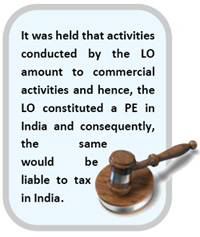|
|||||||||||||||
| Liaison Office- Permanent Establishment or Not ? | |||||||||||||||
|
|||||||||||||||
| buyers, negotiating with buyers, agreeing to a price, negotiating with the buyers and securing orders. The LO would also follow up with customers for after sales support and realization of payments.
The Tribunal therefore concluded that there was a business connection in respect of the income of the assessee and hence, the LO constituted a PE in India.
Whether the activities of LO constituted a PE in India and accordingly, was the assessee liable to tax in India? Contentions of the Assessee before the High Court The assessee contended that it was engaged solely in liaison activities as permitted by the RBI i.e., acting as a mere communication channel between the HO at Korea and the parties in India by communicating technical specifications, commercial terms and bridging the language barrier. The LO comprised five employees whose role was limited to finding out prospective buyers for the assessee's products, obtaining enquiries in that regard and passing them on to the HO in Korea. After obtaining the quotations for the products from the HO, the LO would communicate the same to the intending buyers. Further, it was contended that since the RBI had not taken any action against the assessee for conducting the above activities, interference from the tax authorities was not justified. Contentions of the tax authorities before the High Court The High Court upheld the Tribunal’s order on the ground that the activities conducted by the LO amounted to commercial activities and not merely liaison activities. The fact that the officials of the LO are not signing any contracts would not absolve them from any liability. The Tribunal is the final fact finding authority and the finding recorded by the Tribunal is based on the legal evidence found during the course of investigation and the same has been clearly spelt out by the AO in his assessment order. As regards the assessee’s contention that, since RBI had not taken any action for conducting commercial activities, the finding of the AO are illegal and unjustified, the High Court held that the tax authorities have discovered the facts during the course of investigation and merely because RBI has not taken any action will not render the findings recorded by the AO as illegal or unjustified. Accordingly, it was held that activities conducted by the LO amounted to commercial activities and hence, the LO constituted a PE in India and consequently, the same would be liable to tax in India. Our Comments While setting up an LO, it is imperative to ensure that the activities of the LO are confined to liaison activities alone. In this case, even though the employees of the LO have not signed any contract, the Court has nevertheless held that the LO constituted a PE. This sets a precedent for the tax authorities to tax Liaison Offices based on the facts. The tax authorities can investigate and identify the actual activities undertaken by the LO even though the RBI has not initiated any action. One needs to examine the activities of the existing LO on an annual basis, in the light of the above decision and find ways and means to mitigate the risks identified on such examination as the Finance Act, 2011 has made it mandatory for all LOs to file within 60 days from the end of the financial year, a statement showing activities of the LO in that financial year. |
|||||||||||||||
| Notes: | |||||||||||||||
| 1 ITA No. 451 of 2009 and ITA Nos. 704-708 of 2009 |
|||||||||||||||
|


 Issue before the High Court
Issue before the High Court